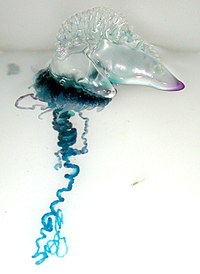
Photo from wikipedia
Breast cancer (BC) is the most common cancer among women worldwide. BRCA1/2 are responsible for 16–20% of the risk for hereditary BC. Other susceptibility genes have been identified; Fanconi Anemia… Click to show full abstract
Breast cancer (BC) is the most common cancer among women worldwide. BRCA1/2 are responsible for 16–20% of the risk for hereditary BC. Other susceptibility genes have been identified; Fanconi Anemia Complementation Group M (FANCM) being one of these. Two variants in FANCM, rs144567652 and rs147021911, are associated with BC risk. These variants have been described in Finland, Italy, France, Spain, Germany, Australia, the United States, Sweden, Finnish, and the Netherlands, but not in the South American populations. Our study evaluated the association of the SNPs rs144567652 and rs147021911 with BC risk in non-carriers of BRCA1/2 mutations from a South American population. The SNPs were genotyped in 492 BRCA1/2-negative BC cases and 673 controls. Our data do not support an association between FANCM rs147021911 and rs144567652 SNPs and BC risk. Nevertheless, two BC cases, one with a family history of BC and the other with sporadic early-onset BC, were C/T heterozygotes for rs144567652. In conclusion, this is the first study related contribution of FANCM mutations and BC risk in a South American population. Nevertheless, more studies are necessary to evaluate if rs144567652 could be responsible for familial BC in BRCA1/2-negatives and for early-onset non-familial BC in Chilean BC cases.
Journal Title: International Journal of Molecular Sciences
Year Published: 2023
Link to full text (if available)
Share on Social Media: Sign Up to like & get
recommendations!